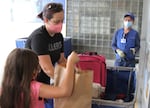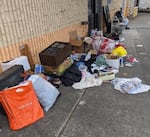Misha Walewski is a special education teacher in Portland. Recently, she was perusing the shelves of Goodwill in search of camping gear.
“I found a big cooler for myself,” she said, “... and I’m looking at this ’Star Wars’ monopoly game here.”
She likes thrift shopping because reusing old things feels right, they’re cheaper than new, and she loves the idea that among all the stuff, there may be a hidden gem.

Special education teacher Misha Walewski shops at a Goodwill in Portland, Ore.
Kristian Foden-Vencil / OPB
“When things shut down and were in quarantine, I definitely realized this is probably my biggest hobby because I was missing it quite a lot. And not necessarily to scratch the itch to buy things,” she said. “But it’s something social that I do with my family and friends.”
Walewski also feels safe while thrifting, as everyone seems to be wearing a mask and social distancing.
Related: Goodwill lays off more than 2,600 employees
At the back of the store, other customers were unloading bags of donations. But staff weren’t helping like they used to. Instead, they were standing 6 feet away and pointing to where the bags needed to go.
And that’s not all that’s changed about thrift store donations.

Airline pilot Cary Freeman unloads bags of donations at Goodwill, while staff stay at least 6 feet away.
Kristian Foden-Vencil / OPB
University of New Mexico marketing professor Catherine Roster said the pandemic has changed why people donate.
“There may have been some people who were fortunate, who could sit around, going: ‘Oh well, now is maybe a good time to clean my garage or my basement,’” Roster said. “But there were also many people who all of a sudden, their home spaces were invaded by other members of their family.”
So maybe an adult child returned home and needed to clear-out a bedroom for a home office. “Or maybe your younger children needed the dining room, that you had things stacked on, to do their schoolwork,” she said.
This summer, Roster interviewed many professional organizers who help people declutter for a living. She found that pandemic decluttering often happened quickly and haphazardly. All the thrift stores were closed and there wasn’t time to separate things into piles to sell, piles to give away and piles to keep.
“That all went out the door with the pandemic,” Roster said. “There was no place to donate. Trips just to landfills increased greatly, where people were actually waiting in line in many parts of the United States. Just taking their clutter straight to the dump.”
And aside from the obvious environmental issues, the rush to clean might also have caused emotional turbulence.
Related: Here are dozens of ways you can help NW communities right now
“Doing it this quickly can induce anxiety and stress and regret. I don’t think they’ve had time to absorb that now. That could be something that maybe will occur later,” Roster said.
Another problem was that many people didn’t want to pay dumping fees, or they felt their stuff could be reused, so they dropped it off outside thrift stores. Goodwill spokeswoman Dale Emanuel said things were being dropped off in front of stores even though they didn’t reopen until May.

Many people didn’t want to pay dumping fees or felt their stuff could be reused, so they dropped it off outside thrift stores, even though they were closed.
Courtesy Goodwill / OPB
“There were a lot of donations that came,” Emanuel said. “They were waiting for us when we would get there. And in many cases they’d [been] picked through, overnight. They’d been attacked by weather. Or by persons who the donations weren’t intended for. So that was a pain-point.”
A loss-prevention officer was stabbed outside a Goodwill in Salem in August while trying to stop someone from rooting through donations left outside.
Many people rely heavily on thrift stores to buy clothes and other essentials. That was made abundantly clear when stores reopened, said the director of retail marketing at Goodwill Industries of the Columbia Willamette, John Hannam.“When we first opened, we opened a store in the Salem area. We had people coming from Vancouver, Washington, to donate there because we’ve been shut down in our whole territory.”
Now all those donations and fewer customers mean many thrift stores are filled with inventory.
“There are more deals I think, because there’s less competition for what you want,” Emanuel said.
That’s reflected in the fact that customers are buying more now, Goodwill said. Before the pandemic, the average customer spent about $19 per trip to a local Goodwill. That doubled when stores reopened, but has since diminished to $2 more each trip.
Meanwhile, anything that doesn’t sell gets sent to a discount outlet where it’s sold by the pound. And if it still doesn’t sell, it goes to the landfill, gets recycled or is shipped overseas.

Capri Salstrom searches the racks at Goodwill for used clothing she can resell on sites like Poshmark or eBay.
Kristian Foden-Vencil
Back in the store, Capri Salstrom was scouring racks for vintage clothing to resell.
“I would say it’s a little less busy. I do think there are less people shopping at the thrift stores. But I haven’t really noticed much of a difference in prices,” she said.
Related: Unraveling the mystery of Portland's 'free-stuff' piles
Still, she has a few tricks for finding a bargain. “I look for good brand names. Things with a high resale value and then I just like to find funky, unique vintage clothing,” Salstrom said.
Other tricks include shopping early in the week because people use the weekends to clear things out. And if you’re looking for furniture, go at the end of the month because that’s when home and apartment leases expire. People are likely to move and get rid of things they don’t want.
Of course, in some neighborhoods, the whole thrift store experience is short-circuited by people leaving perfectly good stuff on the sidewalk.
